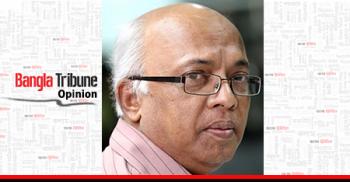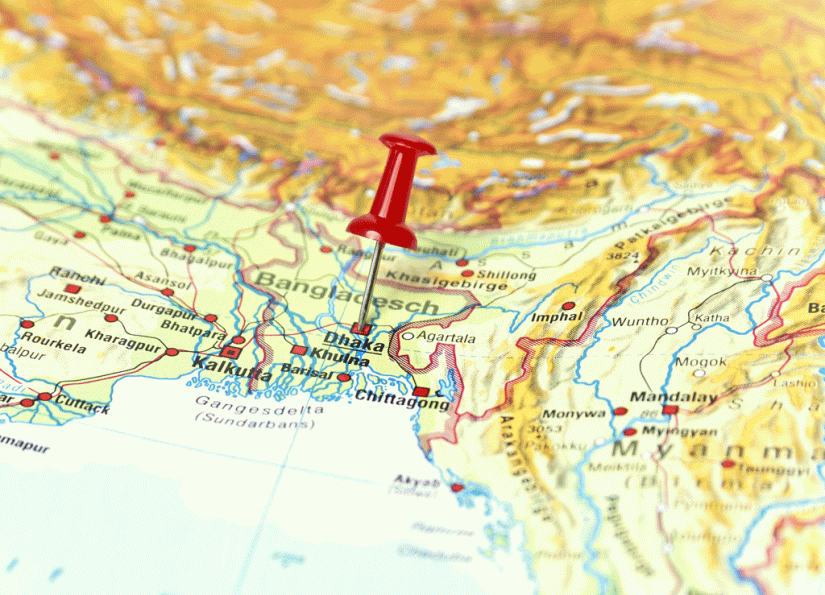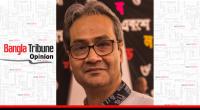 We will soon have a new foreign secretary, in a matter of months if not more. That is certainly good news, for nothing is more important for a nation’s foreign policy establishment than dynamism being an underpinning of it. And given the exigencies of the present, Bangladesh is without question in huge need of not only a thorough reshaping of its foreign policy structure but also a definitive recasting of its diplomacy.
We will soon have a new foreign secretary, in a matter of months if not more. That is certainly good news, for nothing is more important for a nation’s foreign policy establishment than dynamism being an underpinning of it. And given the exigencies of the present, Bangladesh is without question in huge need of not only a thorough reshaping of its foreign policy structure but also a definitive recasting of its diplomacy.
First, to that small matter of reshaping the diplomatic structure. The priority for the new foreign secretary ought to be an adoption of measures aimed at doing away with the atrophy which has clearly been a stumbling block to the projection of the nation abroad in all its dynamism. We speak of the nature of diplomatic appointments which should be made now that we have a relatively new foreign minister in office, along with the minister of state for foreign affairs. The incoming foreign secretary, with his experience in dealing with diplomats from other nations in his long career, ought to be the engine for a change in perspectives at the Foreign Office. With Bangladesh proceeding toward a celebration of Bangabandhu’s birth centenary next year and the fiftieth anniversary of the liberation of the country in 2021, it makes sense to argue that the country bring into its foreign policy the kind of verve and intellectual prowess that can only be provided through its being represented abroad by men and women fully conversant with global realpolitik, the better to link Bangladesh’s enlightened self-interests to it in the decades ahead.
For such dynamism to be initiated in the nation’s diplomatic establishment, the first step cannot but be a turning away from the means which have so long, by and large, defined the nature of appointments at ambassadorial level. There are a very good number of accomplished diplomats who have either not had the opportunity of serving at crucial missions abroad or have largely been grounded at home. That has had to do with the fact that a number of senior diplomats, ambassadors in fact, have conveniently not been recalled to home postings for years on end but have instead moved from one capital to another rather than return home to do their stints at the Foreign Office. A nation’s diplomacy shines bright when the rules relating to diplomatic postings are pursued to the full, without favour or fear or prejudice. Those rules in certain instances have been ignored, to our intense dismay. When senior diplomats who have served an inordinately long number of years abroad go out on a limb to influence their superiors into ensuring their continued stay abroad, it is a sign of diplomacy declining to a state of enervation for the country.
With the new men in charge at the Foreign Office, an overhaul in policy related to ambassadorial appointments is called for. It is immaterial as to whether an ambassador, in all the years he/she has failed to come home or not been asked to come home, has done a splendid job abroad. It is the rules that matter, or should matter. That is a point the incoming foreign secretary should start out with. Every ambassador who has been away from the country for years together, without serving at the Foreign Office for three-plus years between one foreign posting and another, should be recalled and replaced by a fresh new batch of envoys intellectually able to speak for Bangladesh abroad in the coming years. For a country interest in which has been growing abroad for a multiplicity of reasons, diplomatic atrophy will be self-defeating. A sending out of good, dedicated, principled, absolutely professional ambassadors across the globe will be a spur to a recasting of foreign policy, at once assertive and determined and purposeful. And then comes the issue of how seriously we in Bangladesh are in need of a strong and eloquent foreign policy. When Bangabandhu Sheikh Mujibur Rahman spoke of the country’s diplomacy being based on the concept of friendship for all and malice to none, he patently had in mind a foreign policy that would uphold the larger interests of the nation abroad. It was diplomacy he articulated in the days and weeks following the emergence of Bangladesh which saw the country sail through international recognition across the continents. Today, the country is faced with a number of issues on the diplomatic front that call for a profundity of expertise as well as innovation to be applied toward a resolution of them. Top of the list is of course the Rohingya imbroglio, an issue which could well turn into an albatross around the nation’s neck if meaningful diplomacy is not applied toward a resolution. Our friends are India, Russia and China, nations with whom our links are political, cultural, social and strategic. Yet the truth remains that these three countries have not quite responded to our Rohingya-related concerns the way we expected them to. Again, an obstinate regime in Myanmar, encouraged by what our friends have not done for us, has been shifting ground constantly on the need for the Rohingyas to be taken back home.
And then comes the issue of how seriously we in Bangladesh are in need of a strong and eloquent foreign policy. When Bangabandhu Sheikh Mujibur Rahman spoke of the country’s diplomacy being based on the concept of friendship for all and malice to none, he patently had in mind a foreign policy that would uphold the larger interests of the nation abroad. It was diplomacy he articulated in the days and weeks following the emergence of Bangladesh which saw the country sail through international recognition across the continents. Today, the country is faced with a number of issues on the diplomatic front that call for a profundity of expertise as well as innovation to be applied toward a resolution of them. Top of the list is of course the Rohingya imbroglio, an issue which could well turn into an albatross around the nation’s neck if meaningful diplomacy is not applied toward a resolution. Our friends are India, Russia and China, nations with whom our links are political, cultural, social and strategic. Yet the truth remains that these three countries have not quite responded to our Rohingya-related concerns the way we expected them to. Again, an obstinate regime in Myanmar, encouraged by what our friends have not done for us, has been shifting ground constantly on the need for the Rohingyas to be taken back home.
Bangladesh needs smart diplomacy on the Rohingya issue. With million-plus refugees from Myanmar’s Rakhine State already having swamped Bangladesh’s south-eastern region, with thousands of Rohingyas allegedly having come by Bangladesh NIDs and mobile phone SIMs, it ought not to be a matter of surprise for anyone to imagine the corruption involved in the process. A good number of NGOs have justifiably been taken out of the area, but for Bangladesh intrigues aimed at embarrassing the country through making it difficult or even impossible for the Rohingyas to go home continue. A couple of steps are a necessity here. First, our security forces must be thorough in keeping a check on activities in and around the Rohingya camps. Second, and more to the point, diplomacy must be reasserted, and of course reinvented, where persuading outside, especially regional, powers into pitching in with help in a resolution of the crisis is concerned. Special envoys of the Bangladesh government could undertake missions to Delhi, Moscow, Beijing and Naypyidaw in a concerted diplomatic campaign consistent with Dhaka’s emphasis on the requirement of a return of the Rohingyas to their country on the basis of a guarantee of life, property and overall security.
Our diplomacy calls for a deft handling of issues arising out of the problems confronting our expatriate workers in the Middle East and elsewhere. Our missions, indeed our ambassadors, must be psychologically and professionally prepared to defend our citizens when they run into problems --- low wages, long hours, rape, physical torture, legal issues --- at the hands of their employers abroad.
Our ambassadors and high commissioners, if they mean to present the country abroad in all its positivism, should be in constant touch with host governments, with the media and academia and business circles in the host countries and must be ready to respond to all queries and concerns relating to the ground realities here at home.
And, yes, a passing thought: To what extent should the role of the Prime Minister’s Adviser on International Affairs be expanded in order for him to be a vibrant player on our foreign policy stage? It is a position which does not call for silence.
The idea, let it be said again, is smart diplomacy, so necessary in these parlous times.
(Syed Badrul Ahsan is the author of biographies of Bangabandhu Sheikh Mujibur Rahman and Tajuddin Ahmad and writes on politics and diplomacy)
 Opinion
Opinion
30888 hour(s) 51 minute(s) ago ;
Evening 07:45 ; Thursday ; Apr 25, 2024
This country is in need of smart diplomacy
Send
Syed Badrul Ahsan
Published : 15:56, Sep 15, 2019 | Updated : 16:16, Sep 15, 2019
Published : 15:56, Sep 15, 2019 | Updated : 16:16, Sep 15, 2019
0 ...0 ...
/hb/
Topics: Syed Badrul Ahsan
***The opinions, beliefs and viewpoints expressed in this article are those of the author and do not reflect the opinions and views of Bangla Tribune.
- KOICA donates medical supplies to BSMMU
- 5 more flights to take back British nationals to London
- Covid19: Rajarbagh, Mohammadpur worst affected
- Momen joins UN solidarity song over COVID-19 combat
- Covid-19: OIC to hold special meeting
- WFP begins food distribution in Cox’s Bazar
- WFP begins food distribution in Cox’s Bazar
- 290 return home to Australia
- Third charter flight for US citizens to return home
- Dhaka proposes to postpone D8 Summit
Unauthorized use of news, image, information, etc published by Bangla Tribune is punishable by copyright law. Appropriate legal steps will be taken by the management against any person or body that infringes those laws.
Bangla Tribune is one of the most revered online newspapers in Bangladesh, due to its reputation of neutral coverage and incisive analysis.
F R Tower, 8/C Panthapath, Shukrabad, Dhaka-1207 | Phone: 58151324; 58151326, Fax: 58151329 | Mob: 01730794527, 01730794528


